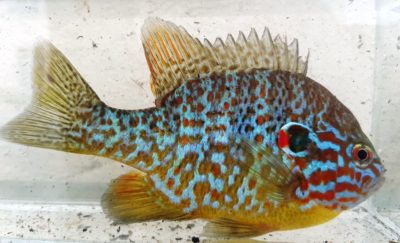Pumpkinseed in nature proves invasive
Published : 23 Jan 2021, 22:13
Invasive alien species such as populations of pumpkinseed, known as a fish species living in aquariums, have increased in Finland’s nature.
The Natural Resources Institute Finland (Luke) has investigated risks associated with 17 invasive alien species classified to be harmful in the EU, the ways in which they spread and their range, and prepared proposals for control measures, said a press release.
The list of invasive alien species of the EU concern includes various aquarium fish and plants, as well as garden plants.
Due to Finland’s location in the north, not all listed species are necessarily harmful here, as our conditions restrict their becoming established and their spread.
“Invasive alien species” means animals, plants and other organisms that have spread outside their natural geographic range, partly due to people’s intentional or unintentional activities. Some invasive alien species have been found to be harmful, threatening biodiversity or related ecosystem services.
As an extension to previous management plans for invasive alien species, Luke most recently (15 August 2019) investigated risks associated with 17 harmful invasive alien species added to the EU list, the ways in which they spread and their current range, and prepared proposals for the control measures required. Of the species added to the updated list, only pumpkinseed has become established in our nature.
In the investigation, it was identified that populations of pumpkinseed, known as a fish species living in aquariums, have spread over a much larger area than what was originally believed. The species was found in at least nine municipalities in southwest Finland.
“We saw that pumpkinseed reproduces effectively in nature, and its populations are increasing in most ponds. It is assumed to become harmful when the fish density increases. Pumpkinseed is a significant competitor and threat to native species”, said Luke Senior Scientist Lauri Urho.
In other parts of Europe, it has been found that, when released into nature, pumpkinseed causes competition over nutrition and decreases in the populations of several different groups of organisms, ultimately reducing biodiversity.
The prepared management measures propose that pumpkinseed populations be removed from all ponds in which this is possible with reasonable resources. In other populations, the number of individuals should be limited so that they do not cause any significant harm.


